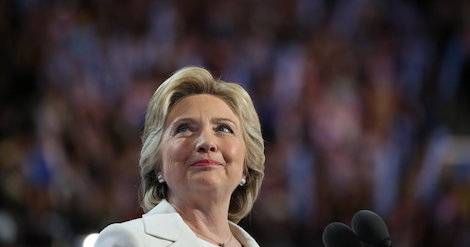
Oh Hillary, My Hillary: A Reader’s Post-Book Conference Lament
Readers don’t always have the time to get to the titles they’re craving most—like the political autobiographies of candidates whom they already know they love, but whose backstories they’re not 100% clear on.
Being one such reader, and being an eternal optimist to boot, I had a perfect November retreat planned: after my candidate of choice (and, I maintain, the only candidate qualified to maintain this democractic republic) secured the presidency, I would retreat to Michigan’s Upper Peninsula to read her three major books in succession. By inauguration, I would not only be proud of my president, but would be so with intricate context.
The electoral college didn’t oblige. Instead of celebrating the first woman president—a learned reader with whom I could fully identify—I had to spend November reconciling myself to the actual/nightmare 45, a person whom it would be absurd to learn about through reading (it’s not as if he exemplifies reader culture himself, after all).
Secretary Rodham Clinton’s books still wait for me. I’ll get to them later, when it hurts less to see how brilliant she is not only in obvious ways, but in nuanced terms.
And then around spring, deep into the daily regrets of a different presidency, I got word that there might be some consolation: Hillary was going to be a speaker at Book Expo America. (Why wouldn’t she?: this is a woman, not only visionary in her political leadership, who weaves bookishness into her daily work.)
I was elated. I had hoped to see Hillary in person for the first time as our president, but seeing her at a book conference seemed to be a sort of salve.
Alas!: I was a presenter, and her talk was available only to attendees on a limited basis. I begged and I pleaded, but those parameters were unmovable. I’d almost reconciled myself to another miss when I found out that Hillary would be bookish-audience speaking again, and soon, at another conference I was attending: the American Library Association’s annual conference, also featuring the bookish superheroine Carla Hayden.
Choirs of angels; eyes alight! Daily press briefing by daily press briefing, the world seemed to be falling apart, but there were bookish settings still offering respite: a vision of something better, an encouraging look forward to possible happily ever afters. Hillary could get us there.
Those of us booked to stay through all of ALA, that is.
This year has been the year of missing Hillary for me: first, in the only capacity that might have protected us all, from health care to other basic equalities; and then, in the case of sources of inspiration, in bookcentric speaking engagements to which I had connection, but to which I did not have a pass.
The day before we left ALA, I sat with an advanced readers’ copy of Pantsuit Nation over dinner. I read about the hope that people felt before November—the passion with which they advocated for a woman who had the credentials to secure a fairer world for all. I teared up over their stories of disenfranchisement and persistent hope, and remembered acutely why I chose the box that I chose on election day.
I flipped through familiar pages to find myself amongst a diverse and hopeful American crowd. I encountered the notion of Hillary as a leader in a book.
I’ve still missed her in her own books (I plead circumstance and time). We’ve all still missed her as a Commander in Chief (please vote next time, guys!). And I’ve now narrowly missed her twice in thoroughly bookish spaces.
But the promise of her candidacy still exists—between the pages of books; in the minds and hearts of library conference crowds; and in the activism of the countless Americans who had her back, whether they’d already read her memoir or not.
As a reader, I keep narrowly missing Hillary—both in the flesh, and as a personification of our best democratic hopes.
I find myself in a rare situation: I hope that my reader’s experience doesn’t correspond too closely to real-world realities. I hope that the happily ever after hinted at in Hillary’s speeches, books, and political activism comes to fruition soon.














